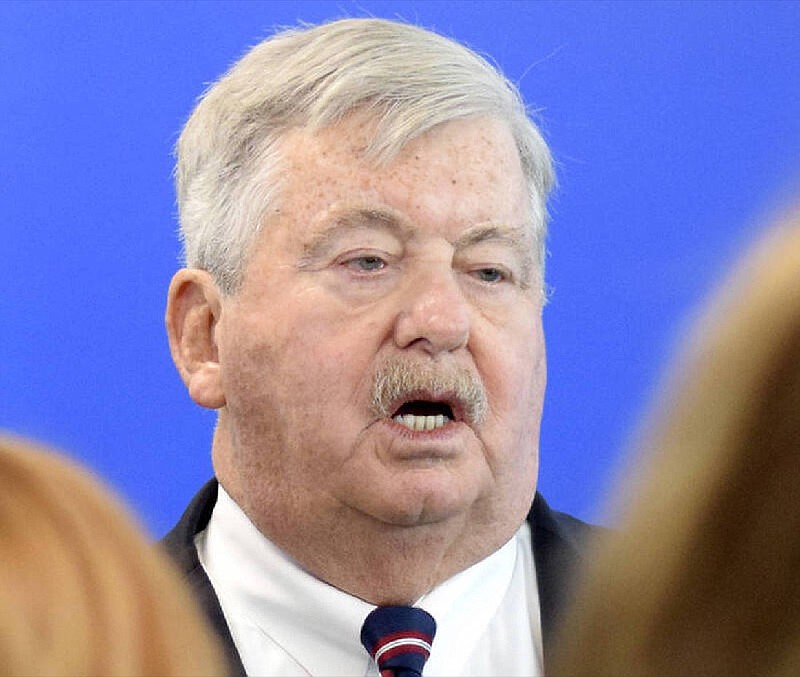NASHVILLE - Unhappy over the Tennessee Education Lottery board's proposed rules and regulations for running the state-sponsored online sports gaming program, top state legislators are eyeing putting the Sports Wagering Advisory Council in charge of the process.
"That definitely is something that could happen," said Lt. Gov. Randy McNally, R-Oak Ridge, the Republican Senate speaker. "We got a real good advisory board, and I think its membership is something that we're very proud of and it, I think, needs to be there to oversee what is going on."
McNally's comments came last week after he and House Speaker Cameron Sexton, R-Crossville, wrote a Feb. 14 letter to lottery board chairwoman Susan Lanigan. In it, they asked the lottery board to delay acting on its proposed draft rules the board had planned to proceed on.
"There have been concerns brought to our attention that some of the rules, as drafted, may be outside the authority given to the Board or Council pursuant to the 'Tennessee Sports Gaming Act,'" the speakers wrote.
Those concerns include high fees for vendors and other issues.
In their letter, McNally and Sexton also cited a "concern that the additional categories of licenses created within the rules aren't within the scope or authority of the Board or Council" under the 2019 law creating online sports gambling here.
"Specifically, the Sports Pool Intermediary License and the Vendor License, and associated fees, are not authorized in the Act," the letter says.
The law gave the lottery board, which is appointed solely by the governor, responsibility to come up with rules and regulations as well as overseeing operations of the plan to allow Tennesseans ages 21 and up to place online bets on professional and amateur sporting events via smartphones.
The panel's work got off to a late start, due to delays in appointing members. When members met for the first time in mid-November 2019, Tennessee Lottery President Rebecca Hargrove told them she and her staff had already come up with rules and regulations and would soon be acting on them.
McNally told reporters Thursday "there might be some changes" in what Hargrove and lottery officials proposed.
"What the plan was was a three-tiered system with one company at the top that would then basically hire like subcontractors on down to the people who actually sell the bets," McNally said. "We think that ought to be done competitively. And maybe having one company at the top is not the best answer. Maybe there should be more than one. I've kind of left that up to the advisory board, and we've got some real good people on it."
McNally, who opposed the online sports betting bill, noted a former FBI agent as well as a Knox County district attorney general staffer are on the sports gaming advisory council with others knowledgeable about the industry.
"They'll review it and they'll come to some agreement with the lottery board about how that's done," McNally added.
In the meantime, Sen. Steve Dickerson, R-Nashville, who sponsored the original legislation, has teamed up with Rep. Andrew Farmer, R-Sevierville, on a new bill.
The legislation would give the advisory board, "in consultation" with the lottery board, formal control to "enforce this part and supervise compliance with laws and rules relating to the regulation and control of wagering on sporting events in this state."
Hargrove is widely considered one of the preeminent state lottery chiefs in the nation and was heavily recruited by then-Gov. Phil Bredesen in 2003 to implement the new Tennessee Education Lottery after she salvaged Illinois' lottery decades ago and later successfully launched state lotteries in Florida and Georgia.
Tennessee's program has been a cash cow for education, generating more than $5.25 billion for college scholarships, the state's Drive to 55 last-dollar community college scholarships and other education programs over the years.
Revenue from sports gaming would go to scholarships, an infrastructure fund for local governments and gambling addiction programs.
But sports gaming industry advocates and others say betting is an entirely different deal from lotteries with far more competition among states and a clientele that can travel anywhere online.
Hargrove and the lottery board are looking at lower payouts to players on the theory that it would maximize returns for designated programs. Each wager under the law is subject to a 20% tax. Critics say the board's plan to keep payouts at 85% is too low and shortsighted, arguing boosting payout percentages will draw more players and drive up net proceeds.
Critics also say there should be more competition among companies operating here.
Under the 2019 law, the Class I operators each would pay a $750,000 licensing fee. But critics say lottery officials' proposed fees for lower-level companies providing various services such as software and data services to sportsbooks are too high and disclosure requirements too onerous.
The Tennessee Journal reported Friday that Jennifer Roberts, an attorney and gaming law expert from Nevada who was recently hired by the lottery to be in charge of the program, said it's necessary for the state to scrutinize vendors and contractors to ensure they're on the up and up.
The goal, Roberts was quoted as saying, is to make sure the contractor or vendor "is not Tony Soprano." The advisory panel voted to reduce the proposed $75,000 annual Level II registration fee to $10,000, plus any additional costs needed to complete background checks. Level III vendors' fees would be reduced from $7,500 to $500, according to the Tennessee Journal.
The slow startup also has been a concern. The legislation that authorized sports wagering became law 10 months ago and no startup date has been set.
Contact Andy Sher at asher@timesfreepress.com or 615-255-0550. Follow him on Twitter @AndySher1.
